2. Everyone Decides Together
What else did you pass back and forth with Nintendo as you moved forward with Beat the Beat: Rhythm Paradise?
We tried not to focus too much on competing. There are a few two-player games included, but basically, I hope one person will play, with others looking on.
Yes, when you square off against someone, you become too absorbed in your own playing and can’t see when someone else messes up - which is the best part!
This game is good for preying on others. (laughs)
(laughs)
Even when just one person is playing this game, it’s fun - as if the people watching are playing, too. So there was no need to make everything for simultaneous play by multiple people.
That’s right. And we paid attention to sound effects that would have an impact and get stuck in your head. When your mum passes by and hears the voices in the game, I want her to say, “What in the world are you doing?” (laughs)
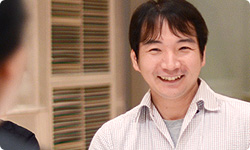
That’s the charm of sound effects that drag in people who just happen along. Is there anything you did in past games that you changed this time?
The screen is bigger, so silly things look better - like when you kick a ball and someone behind you catches it . The Nintendo DS system was too small to show things like that.
Things that you can laugh at aside from the main character.
That’s something especially people watching from the sidelines would notice.
One key point this time is how there are so many elements to please bystanders. Another thing I sensed about Beat the Beat: Rhythm Paradise is a dynamic contrast between large and small.
Something like a water flea appears, as well as a rocket.
How did you come up with such ideas?
This time, we all chipped in our ideas.
You all came up with them?
Yes.
Wow, that’s unusual. Within the larger framework established by Tsunku-san, if I could put it this way, it seems like everyone all did whatever they wanted, adding in various elements.
We couldn’t deviate from the foundation of the game, so we at TNX were always looking forward to the characters that would come up. But we often thought, “Why these visuals for this music?” (laughs)
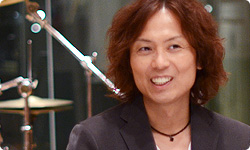
That’s just how the songs seemed to us!
Well, they were completely different from what we imagined! (laughs)
I always said, “That’s what your song suggested to me!”
But it’s really interesting. Say, I thought I’d made Western food, but they were adding in all kinds of Chinese food or a Japanese-style sauce, so I was like, “What is this?!” (laughs)
You made French cuisine, but they served it with Chinese hot sauce.
I didn’t mind too much, though. I’m not sure why, but that was extremely interesting.
Kamada-san, what was it like for you in your work on the songs?
It was that way for me, too. A song would have a European air, but the visuals would be Chinese in style. I’d be surprised and think, “Does a game in which you wear a kimono and swing a sword really suit this music?” But Tsunku-san didn’t mention the graphics, so we worked all the way to the end, thinking, “Doesn’t he think anything is off about this?”
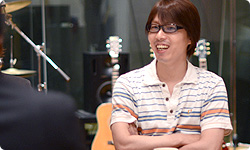
But rejecting them might have put a stop to the whole thing!
Well, you generally wouldn’t think something like volleyball would fit bossa nova, would you? That’s the game called Bossa Nova .
I don’t get why they’re on a turntable! (laughs)
And it’s a little sexy. The voices are…sexy! Incredibly so! (laughs)
But for some reason, it matches just fine.
At first glance, it’s a mismatch, but…
It isn’t really.
It may be unique to these games that you’re doing something ridiculous in them, but the songs are amazingly cool.
I wonder why at first glance the balance is weird, but once you play it, it has an unusual congruence.
I wonder. We pretty much do whatever we want. For example, when Takeuchi-san draws something, the visuals come up before any discussion, and he says, “Put this in.” Yone-san is the same. Most of the time he just shows up and says, “Here.”
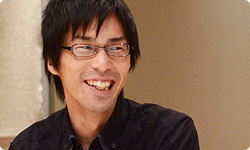
You programmed them in a state of anxious trepidation.
I’d think, “They won’t get the better of me!” and just do it. (laughs) I’d try not to force it together and preserved the image they had created, and it turned out to be interesting.
You can do it that way because you usually work separately.
I, too, just hand them what I’ve made. We all progress with what you might call an irresponsible responsibility, and the end result is fun.
There’s a certain rhythm to the very way you work together. But I think that only works because your theory of rhythm underlies the game and doesn’t budge. By the way, each of the games has a name. Who determines those?
Everyone.
Everyone decides those, too?
Yes. Is that bad? (laughs)
No, no. (laughs) Usually, one person would decide, so it’s rare that everyone would also decide the names together. When everyone decides the name of a game, the process can get out of hand, so you pick one person to do it, but…apparently not for this game.
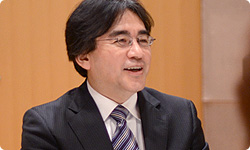
There are different people for visuals, sound and programming, but with regard to ideas for the game itself, everyone really does it together.
I guess that works because the series is built around such a solid core.
You could also say it’s a wasteland! (laughs)
(laughs)